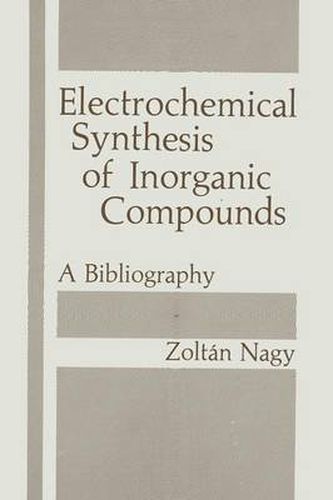Readings Newsletter
Become a Readings Member to make your shopping experience even easier.
Sign in or sign up for free!
You’re not far away from qualifying for FREE standard shipping within Australia
You’ve qualified for FREE standard shipping within Australia
The cart is loading…






This title is printed to order. This book may have been self-published. If so, we cannot guarantee the quality of the content. In the main most books will have gone through the editing process however some may not. We therefore suggest that you be aware of this before ordering this book. If in doubt check either the author or publisher’s details as we are unable to accept any returns unless they are faulty. Please contact us if you have any questions.
Electrochemical synthesis of inorganic compounds is a relatively unknown field. The successful, large industrial processes, such as chlorine-caustic production, are well known, but the large number of other compounds that have been synthesized electrochemically are much less appreciated, even by electrochemists and inorganic chemists. The last comprehensive book on this subject was published in the 1930’s and no modern review or summary of the whole field is in existence. But the field is in no way dormant, as attested by the large number of publications, undiminished throughout the years, describing new syntheses and improvements of old ones. Indeed, it can be expected that practical applications of electrochemical inor ganic syntheses will increase in the future as an increasing portion of our energy will be available in electrical form. Electrochemical processes have important advantages over chemical routes: often the selectivity of the reaction can be better controlled through the use of potential control at the electrode, and the creation of environmen tally harmful waste material can be avoided more easily since one is using the purest reagent - the electron. In addition to development of new synthetic routes, many old ones, which were found to be un economical in the past, are worth reexamining in light of the recent considerable advances in cell design principles, materials of construc tion, and electrode and separator materials, together with our im proved understanding of electrode reactions and electrocatalysis. It is in the hope of accelerating this process that this bibliography is published.
$9.00 standard shipping within Australia
FREE standard shipping within Australia for orders over $100.00
Express & International shipping calculated at checkout
This title is printed to order. This book may have been self-published. If so, we cannot guarantee the quality of the content. In the main most books will have gone through the editing process however some may not. We therefore suggest that you be aware of this before ordering this book. If in doubt check either the author or publisher’s details as we are unable to accept any returns unless they are faulty. Please contact us if you have any questions.
Electrochemical synthesis of inorganic compounds is a relatively unknown field. The successful, large industrial processes, such as chlorine-caustic production, are well known, but the large number of other compounds that have been synthesized electrochemically are much less appreciated, even by electrochemists and inorganic chemists. The last comprehensive book on this subject was published in the 1930’s and no modern review or summary of the whole field is in existence. But the field is in no way dormant, as attested by the large number of publications, undiminished throughout the years, describing new syntheses and improvements of old ones. Indeed, it can be expected that practical applications of electrochemical inor ganic syntheses will increase in the future as an increasing portion of our energy will be available in electrical form. Electrochemical processes have important advantages over chemical routes: often the selectivity of the reaction can be better controlled through the use of potential control at the electrode, and the creation of environmen tally harmful waste material can be avoided more easily since one is using the purest reagent - the electron. In addition to development of new synthetic routes, many old ones, which were found to be un economical in the past, are worth reexamining in light of the recent considerable advances in cell design principles, materials of construc tion, and electrode and separator materials, together with our im proved understanding of electrode reactions and electrocatalysis. It is in the hope of accelerating this process that this bibliography is published.